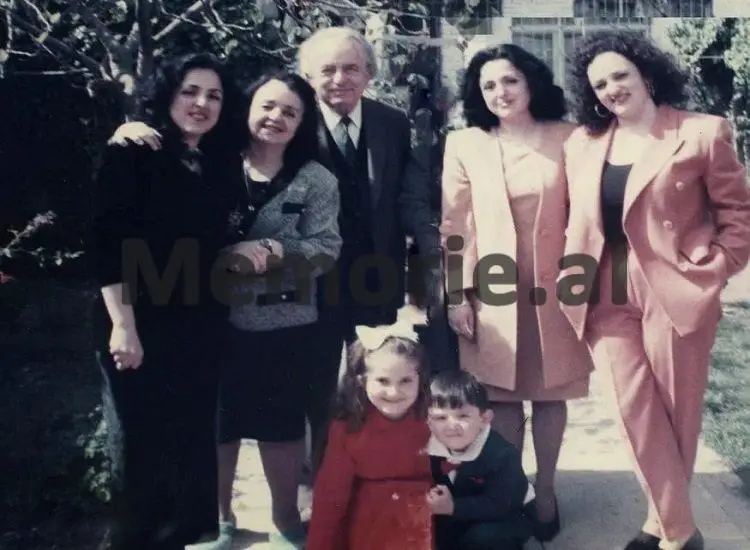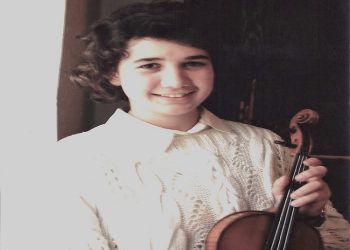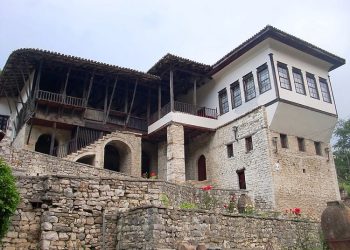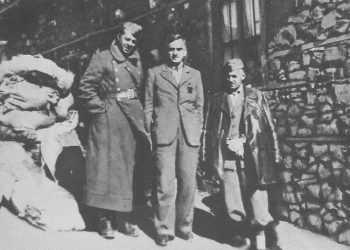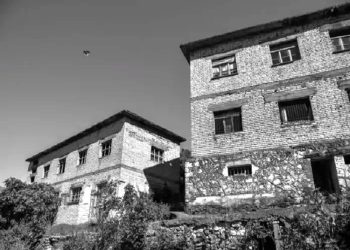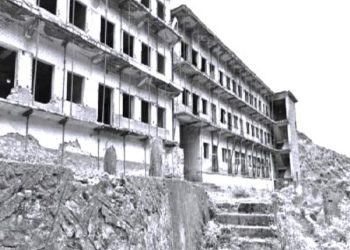By Blerina Goce
Memorie.al / They cannot remember their father, without the glasses and the pencil, which he always had in his hand. Today, his daughters seem to keep very clear the memory of their father and that endless study work, within the walls of the house. Mira, one of his three daughters, even today can’t find anyone to get even close to him. He is reluctant to speak, he is afraid that the words will be confused with the inclusion of emotions inside, but what is special remains so, regardless of the emotional part of the relative man. Always bent in front of the typewriter, not for nothing one of the friends of the daughters of Prof. Castrati, he would notice that he remembered uncle Jupi, always with his back. “It is an imposing figure, it can even define an emblem in our lives. Bearing that in mind, I have no exaggerations in what I say”, – notes Mira Kastrati.
“Home was everything to him. Family was everything. He gave love to the maximum and received it in the same form. I can call him a ‘patriarch’ and a fulfilled person in all aspects of his life: as a family man, as a husband, as a father. I call him a ‘realized patriarch’ even in his position as a professional, lecturer and at the same time in the figure of a scientist. That gift that nature had given him, he had given him along with the work, with the will, with the correctness, with the scrupulousness, with the precision of an unrepeatable work”!
Therefore, bearing in mind these, it does not seem excessive a determination that others have made that; “Prof. Jupi is a demigod.” “The work he has done is inexhaustible. Only when he was in Italy, with Prof. Dhimitër Shuteriqin, have brought copies of documents from the Vatican, which an entire institution has failed to do. Because for him life had meaning only with work, with the work he knew how to do and wanted to do. And he always knew what he wanted to do.
Such determined people are rarely found. On the occasion of my 75th birthday, in 1999, when he was simultaneously awarded the title of ‘Grand Master of Work’, Prof. Jorgo Bulo once said an expression of Seneca, which I am paraphrasing. “Seneca said that half of our life goes to us not knowing what we are looking for, the rest goes to correcting what we did wrong. Thus, most of life is inefficient. Prof. Jupi has challenged Seneca’s statement. He has done work, work, work and a mountain of work.”
But the adoration for him could not be so deep, if alongside the scholar and devoted man, he was not a devoted parent. So much so that today his daughters do not know how to define their relationship with him, only as exceptional. “In any case, dad was willing to meet our demands.”
Despite the time, which was never enough for him (the day was short with its 24 hours for the work he wanted to do), he would always find space and warm words for his children and wife. Mira cannot forget the letters she wrote every morning, before leaving for work, to her children, where she determined exactly where she would go and what time she would return to the “spirits of the father”. And he was always punctual…!
“Exactly because of this, it was imposing and defining in our lives. He was such that he was himself in relation to us. He created the relationship only when he had absolute trust and love”, – emphasizes his daughter.
Thanks to this love, she does not hesitate to describe their small family in Shkodër as an oasis apart from everything else. “A different reality from the lifestyle of the rest of society. And this has been the merit of my two parents. Together they created what in Shkodër they called the ideal couple”.
And as it is always said, behind a successful man, there is such a self-sacrificing woman. The first consultant of Prof. To Jupit, it would undoubtedly be his wife, Drita. Mira affirms that it was largely thanks to her mother that the work and life of Prof. Jupit, may it flow smoothly and be fruitful to the fullest. Next to this man of studies, she was a mother and a wife, but also a good friend of her husband.
Growing up in the same neighborhood, with an age difference of ten years, their relationship was not that of a love between two young people, crowned later with the approval of their elders. But even here Prof. Jupi did not hesitate at all, when they proposed to see Drita as his future wife, he answered “yes”.
“It was not a strained relationship, but a relationship of mutual love, a relationship of respect, which I actually cannot see in other couples. Such a lived relationship, that only at a certain age I was able to understand how different it had been from the usual one”.
An educator by profession, she, Drita, was the first proofreader of her husband’s writings. “His writings, before they were published, had to be read by his mother and were published only after she gave her approval”, – claims Mira.
It was she who also decided which work would be published first (their daughter brings to mind the publication of “The History of Albanian Analogy”, volume I, alongside the study work on De Rada and the decision by her mother to was published first), despite the fact that it was about the work and scientific life of prof. Jupit.
RESTRICTIONS
What conditioned it was only physical time. With these limits, he thought that he would not be able to achieve all the goals he had. And this would also be his hostage. “His only drawback was that he always required work, work and 24-hour work, so he had to be much more, to give all that inner potential he had,” says his daughter.
But even the years lived in a closed regime would undoubtedly affect the work of a man of studies.
“The restrictions were very strong, because direct contact was impossible. He worked with archival sources and had essential connections with archives, foreign libraries, scientists, and his colleagues abroad. But even a letter sent to him from abroad was checked. The letters came open from the post office, in the most brutal form. And this was very hurtful, very burdensome to such a person, who needed this kind of communication”!
Friends
He never went out to drink coffee with friends. Only the house was the place of reception for those who wanted to meet him, but even these meetings were for the most part only for work matters.
For his daughter, Mira, the house was almost a place of pilgrimage, where everyone came to seek information and he gave everyone the best welcome, giving them what they wanted. “He used the expression that; “in science there is a place for everyone”. All that colossal, extraordinary work he had done to gather information, he gave it in writing and never in words, to anyone who came and asked for it”.
But he can never call his father a man of conversations and tables. The few friendly relationships he had were of the family type. “It was very orderly, very correct. Father never liked the pointless visits to pass the time. Not having time to nurture relationships outside of working hours, even the visits were in function of work, except for New Year’s or our birthdays.
Manuscripts, diaries and correspondence
There are thousands of pages written by him. You will find there manuscripts of unpublished works, personal and scientific diaries, correspondence with researchers and well-known people of letters, etc. All are fanatically guarded by the daughters of Prof. Jupit with the opinion that very soon they will all be systematized and most of them will manage to see the light of publication.
“There are many diaries. There are thousands of diary pages, where the daily life is given with the various experiences he had. Dealing with his diaries is a work in itself, which requires special researchers. In these diaries, the story comes out, the different relationships that he had in his daily life, the difficulties, the successes, the obstacles come out”, – notes the professor’s daughter.
No less valuable is the personal library and archive, which his heirs are working to systematize. A job that should have been in the memory of the relevant state institutions, which have actually done nothing in this regard.
The library of Prof. Kastratit, is one of the largest personal libraries in our country. Created by him since he was 14 years old, this library also “narrates” the stages of his formation. “At first he was attracted by literature, then by history. In fact, the part of his studies, when he was a student in Albania and then in Turin, Italy, with the entire library, the books of that period, is not missing here either.
The most interesting part, without a doubt, is his correspondence. As the daughter specifies, the epistolary or correspondence is part of his personal archive, which will be selected and then published, together with works left in manuscript.
There are dozens of manuscripts of his unpublished works. These are mentioned by Prof. himself. Jupi, shortly before he passed away and come in a paraphrased form, in the articles published by Begzad Baliu, after the researcher’s death.
“Albanian Bibliography”, “Arbëresh Studies”, “Literary Studies”, “De Rada’s Works”, “Studies for Ndre Mjeda”, etc. His first four manuscripts alone span more than two thousand pages each.
“The professor spoke to me with pain, how his work about Ndre Mjeda was banned, how he hid the manuscripts about Faik Konica, how the book about Skenderbeu was banned, how the volumes of the bulletin were taken out. Within the thirty works planned a year ago and not even in the other thirty volumes, it was difficult to include all the works, manuscripts, projects, syntheses and other materials that formed a great archive of Albanian civilization”, Baliu underlines, in an article of September 22, 2003.
The personal recognition of Prof. Kastrati with the golden constellation of Albanian linguistics: Aleksandër Xhuvanin, Kostaq Cipon, Justin Rrotën, with Eqrem Çabej (with whom many things are connected, not only scientific, but also personal and family), with Mahir Dom, Shaban Demiraj, etc. ). Special are his acquaintances and correspondence with the greatest albanologists of the time and outside Albania: with Maksimilian Lamberci, Desnickaj, Olberg, Gertrude, and so on.
The largest letter exchange in the Albanian tradition, organized according to continents, countries, etc. There are five thousand letters and three thousand photographs. A personal correspondence, with information about the entire path of Albanian studies. An exchange of letters with the entire Albanian world, from Australia to Paris and New York.
“Before him was Konica, with three thousand cards. Before Konica, De Rada with a thousand cards”, Baliu emphasizes. “His unpublished works are a long list, for the publication of which we are encountering many difficulties, because the relevant funds are not found. We are trying as a family, but I don’t know how much we will achieve, because these are initiatives, plans that should be undertaken only by institutions”, – notes the professor’s daughter, Mira.
She has been sending pages, programs and lists of these works in manuscript to the Ministry of Culture and the Academy of Sciences for four years, but has not yet received a response.
The institutions passed the anniversary of one of the greatest Albanian albanologists and researchers in silence, not organizing any special activity for this occasion.
Who was…?
He was born in Shkodër on April 15, 1924. He completed his five-grade primary school, high school and high school in his hometown. For a short time, he also studied at the scientific high school “Galileo Ferraris”, Convitto Nazionale “Umberto I” in Turin. During the Italian occupation, as an anti-fascist, he was imprisoned, interned in concentration camps: “Comando Z”, in Kodrat e Tepe, Shkodër, in the infamous Prizren prison, etc.
He graduated from the Faculty of Philology at the University of Tirana, where he defended his studies with the diploma topic “Contributions to the study of Ndre Mjeda” (1958). He then followed the post-graduate scientific qualification, for the degree “Candidates of Philological Sciences”, with the dialectological monographic study; “The speech of Theth” (1962), under the scientific leadership of Prof. Eqrem Çabejt.
One of the founders of the Higher Pedagogical Institute of Shkodra, the name of the University “Luigj Gurakuqi” was conceived and designed by him.
External scientific associate, for 50 years, in charge of the literary circle of the house of culture in Shkodra (1947-1957), chairman of the city library council (1948-1990), member of the scientific council of the Shkodra district (1988), chairman of the Culture and Arts Committee in Shkodra (1989), etc., he was one of the founders and leaders of the scientific magazines, “Buletini i Shkodra” and “Shkodra”, etc.
He was honored with “Distinguished Educator” (1954), “Medal of Labor” (1959), “Naim Frashëri” Order of the Second Class. (1970), “Teacher of the People” (on the occasion of the 100th anniversary of the first Albanian school in 1987), etc. It is included in the International Encyclopedia of Biographies, Thirteenth Edition of World Intellectuals (Cambridge, December 1997). On the occasion of his 75th birthday, the President of the Republic decorated him with the high title of “Grand Master of Labor”, while he was also declared “Honorary Citizen” of Shkodra.
About 40 published and republished works, in a span of more than 40 years. In his bibliography, of about a thousand items, we can single out the following works: “History of Albanian grammar” (1635-1944), “Faik Konica” (monograph), 1995; “Studies for De Rada” (monograph) New York, 1999; “Arbëreshe studies” (monograph), 1999; “History of Albanianology” (1497-1997), the latter in three volumes.
The monograph on Konica is the most complete and comprehensive study published on it. Prof. Jup Kastrati, closed his eyes on September 22, 2003. Memorie.al




